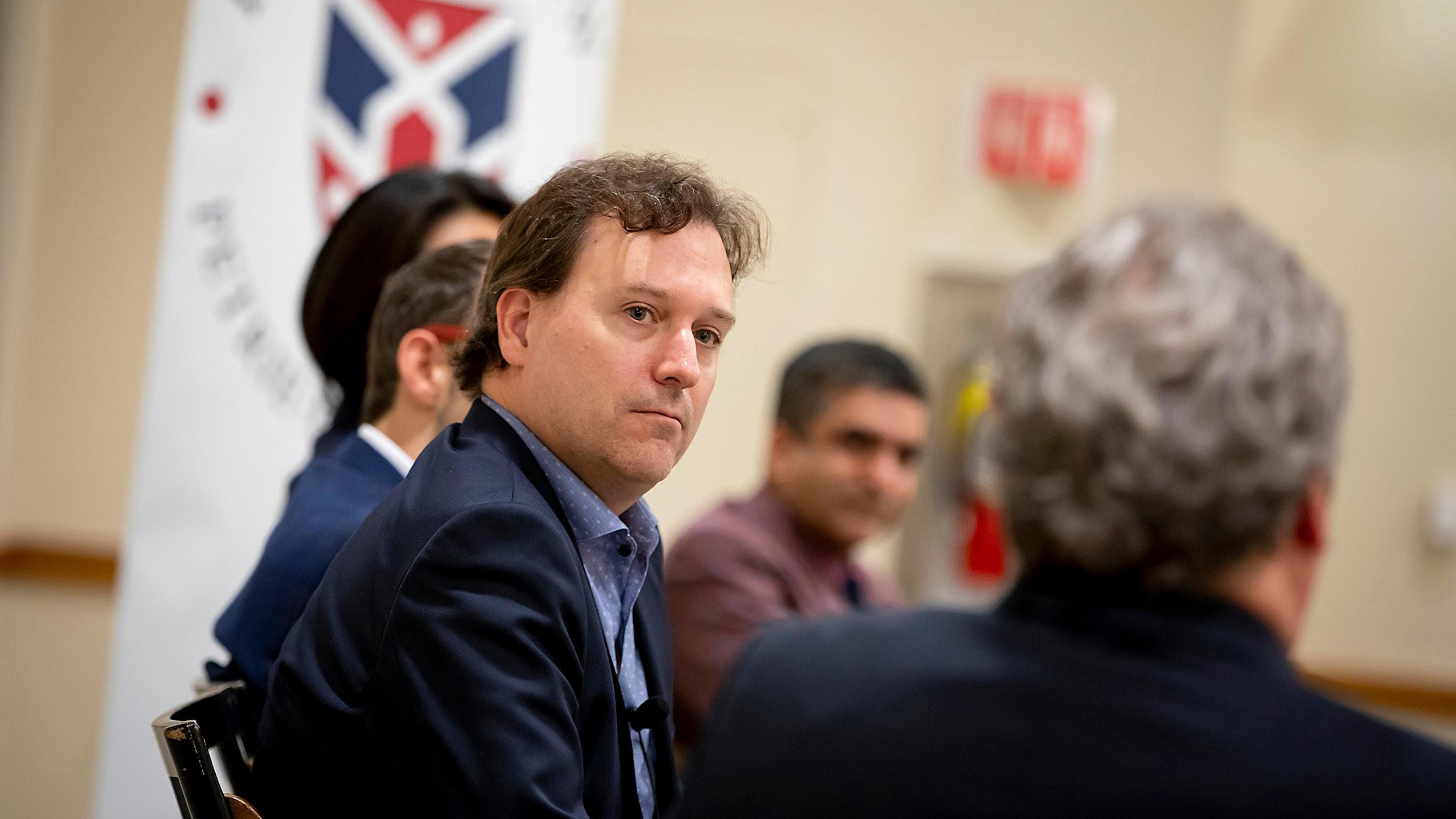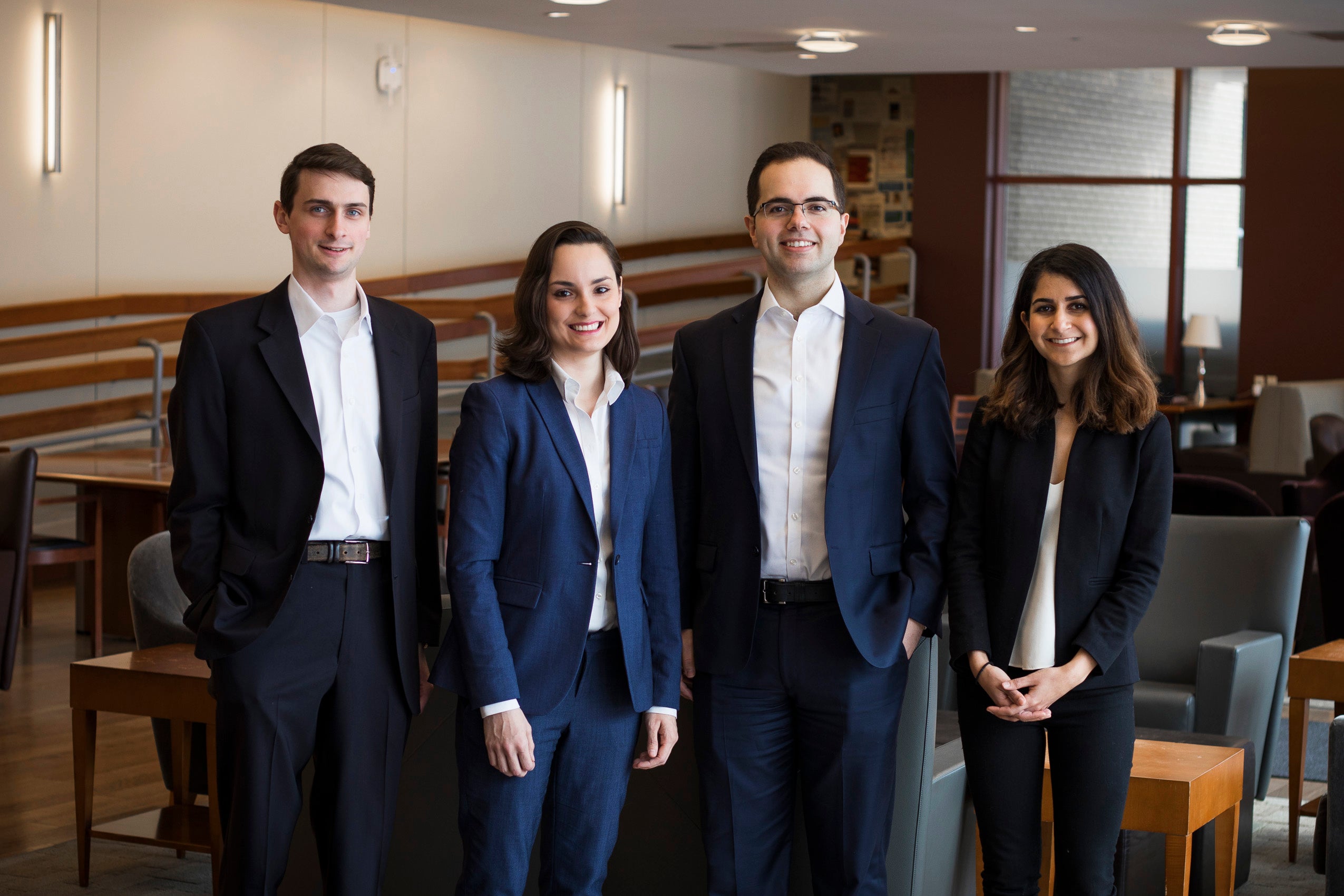People
Glenn Cohen
-
A cautionary tale for Silicon Valley
October 9, 2018
The Wall Street Journal investigative reporter whose new book chronicles the spectacular collapse of the blood-testing company Theranos and its alleged fraudulent activity told a Harvard audience that the fall is a cautionary tale for other high-tech firms aspiring to disrupt the health care industry.
-
When Your Dreams of Motherhood Are Destroyed
October 2, 2018
...Mehl soon learned she was one of 950 patients whose genetic material was destroyed when the temperature inside the storage tank rose more than 150 degrees...“Any attempt to regulate reproductive technology almost inevitably leads to difficult questions relating to abortion,” says I. Glenn Cohen, director of the Petrie-Flom Center for Health Law Policy, Biotechnology, and Bioethics at Harvard Law School. “As a result, people have been shy, including those on the left who might be interested in pushing regulation in this area, because once they do so, there’s a real possibility it ends up resulting in restricting women’s reproductive rights.”
-
Big questions raised by big data
September 20, 2018
During the introduction to the book launch event for “Big Data, Health Law, and Bioethics,” one of the editors, Harvard Law School Professor I. Glenn Cohen ’03, faculty director of the Petrie-Flom Center for Health Law Policy, Biotechnology, and Bioethics, told a story about how powerful – and perhaps foreboding – big data can be.
-
As part of a cooperative agreement between the two schools, Harvard Law Professors Glenn Cohen, Holger Spamann, and Lucie White traveled to France in June to teach at the eighth annual Intensive Doctoral Week (IDW) at the law school of the Institut d’Études Politiques de Paris, more commonly known as “Sciences Po.”
-
...It’s impossible to expect a true sense of privacy among 55,000 people, but users and bioethicists alike have lingering questions about Facebook’s use of data. “How much of Facebook is truly closed?” asked Glenn Cohen director of Harvard’s Petrie-Flom Center for Health Law, Biotechnology and Bioethics. “How visible are your posts? Could someone take a screenshot of something you said and repost it?”...Cohen is also concerned about the possibility of so-called anonymized data being used for commercial reasons. Imagine what kind of connections future data miners could make based on your social media posts, fitness trackers, voting record, purchasing history and perhaps even genetic data.
-
What If The NFL Were Regulated By OSHA?
May 23, 2018
Last month, 253 men got new jobs. The process was highly publicized, and employers announced new hires to an audience of millions on live television. It’s likely that no one in the Cowboys’ stadium, where the 2018 NFL Draft took place, was thinking about them that way, though...But in the eyes of the law and regulatory systems, professional football players are, in fact, employees of the NFL. That means that the Occupational Safety and Health Administration (OSHA), which is responsible for overseeing and intervening in health risks to employees, could technically step in and issue rules and regulations to reduce the potential harm caused by the work they do—which, in this case, is play football. “The NFL is many things,” says Glenn Cohen, a professor of health law and bioethics at Harvard Law School. “It’s also a workplace, and it ought to be regulated the way other workplaces are.”
-
...Costly medicines can give rise to misplaced expectations for patients and doctors navigating America’s Byzantine health care system. And the problem is compounded by well-intentioned regulators trying to help desperate patients whose medical needs are unmet. “The problem is the way the system creates incentives for both drug makers and insurers to act as they do,” said I. Glenn Cohen, a Harvard Law School professor who is an expert in bioethics and health law policy. “When you allow private insurers to make decisions with only a patchwork of state regulations, they will choose not to cover every drug approved by the FDA. And drug companies are for-profit entities that set prices based on market conditions. This is why you have debates over coverage.”
-
Authorities Use DNA Testing Service to Identify “Golden State Killer” – What Does This Mean for You? (audio)
May 8, 2018
An interview with Glenn Cohen. More than 12 million people have had their DNA analyzed by direct-to-consumer genealogy tests like 23andMe and ancestry.com. That number more than doubled last year, giving the industry a huge boost. Late last month, authorities charged a man in Sacramento County, California as the so-called Golden State Killer after tracking him down with a private DNA test company, one called GEDmatch. Joseph James DeAngelo is accused of a string of rapes and murders in the 1970s and 80s. The suspect never gave his own DNA to GEDmatch, but his relatives did, and that allowed police to find him. Some law enforcement officials say such tests are a promising tool to catch criminals, while privacy advocates are worried that innocent people might be swept up if a search is too broad.
-
Three Planned Parenthood affiliates sued Wednesday to demand taxpayer money keep flowing to the country’s largest abortion network, saying a new Trump administration policy appears designed to cut them out of family planning money. Affiliates in Wisconsin, Ohio and Utah said changes announced by Health and Human Services would boost clinics that focus on abstinence rather than providing contraceptives. They said HHS didn’t follow the law last year when it issued the new funding priorities for doling out money under Title X, which is the government’s main family planning fund...In 1991, the Supreme Court upheld HHS rules prohibiting clinics that receive Title X funds from advising or referring patients for abortion services. Glenn Cohen, a law professor at Harvard, said that kind of precedent suggests the government has latitude to set conditions on the funding. “Challenging an administration’s decision on what funding priorities to set, a litigant faces an uphill battle,” he said. Mr. Cohen said if the court were to decide HHS didn’t follow the proper steps when issuing its new policy, the government could go back and do it accordingly.
-
Ethicist foresees choosing your baby from dozens of embryos
April 18, 2018
You’ve probably read about concerns over “designer babies,” whose DNA is shaped by gene editing. Greely is focused on a different technology that has gotten much less attention: In a startling bit of biological alchemy, scientists have shown that in mice, they can turn ordinary cells into sperm and eggs. It’s too soon to know if it could be done in people. But if it can, it could become a powerful infertility treatment, permitting genetic parenthood for people who can’t make their own sperm or eggs...Once the genetic profile is done, could it come back to haunt a child if, say, a life insurer or nursing home demanded to see it to assess disease risk? How would the large number of rejected embryos be handled ethically and politically? Perhaps future regulation could limit the number of embryos created, as well as what traits a couple could select for, said I. Glenn Cohen, a Harvard law professor.
-
Now in its second year, the Harvard Law School Public Interest Scavenger Hunt continued its focus on HLS history and trivia, but also highlighted alumni who have done important public interest work.
-
...Critics say the pervasive problems in Togo’s medical system — where equipment frequently malfunctions, electricity and water supplies are unreliable and new doctors earn less than taxi drivers — are the result of government corruption and ineptitude. But the current unrest in Togo extends far beyond the nation’s troubled health care system...I. Glenn Cohen, a professor at Harvard Law School and an expert on health law and bioethics, said medical ethicists generally agree that the potential benefits of a doctors’ strike can justifiably outweigh the potential risk to patients, if the dispute is about the quality of patient care (as opposed to, for example, pensions or vacation time). A recent peer-reviewed study of doctor’s strikes around the world found no evidence that they lead to an increase in patient mortality, he said. “When you agree to become a doctor, you do not agree to work under any possible condition with whatever quality of care that might mean for patients,” Professor Cohen said.
-
Can Lost Embryos Give Rise to a Wrongful-Death Suit?
April 6, 2018
Over a single weekend in March, an unprecedented disaster hit fertility clinics—twice. First came the news that the University Hospitals Fertility Center in Ohio, lost more than 4,000 eggs and embryos in a malfunctioning cryogenic tank. Then, in an unrelated incident, Pacific Fertility Center in California reported that liquid-nitrogen levels had fallen too low in a tank holding “several thousand” eggs and embryos, affecting an unconfirmed number. In-vitro fertilization can be a draining process—financially, physically, emotionally. And for some families, these embryos had been their last chance to have biological children. Dozens of lawsuits have since been filed; parents and would-be parents spoke of the children they will never have, of the siblings their children will never know. At times, they spoke not just of “embryos” but of “babies.”...The filing cites a 1985 Ohio Supreme Court case, Werling v. Sandy, that held a viable fetus is a person. But I. Glenn Cohen, a professor at Harvard Law School, says that case may not be the most relevant one here. A viable fetus is one that can survive outside of a womb. And in Egan v. Smith, an Ohio Court of Appeals court held in 1993 that wrongful death could not be brought for a nonviable fetus. This case is more likely to apply to embryos. “It’s a real stretch,” he says, “but lawyers are supposed to give every argument they can.”
-
...On the surface, traveling for a medical procedure may not seem appealing, but people typically do it for outpatient procedures with quick recoveries and wrap a vacation around it, says MTA President Renee-Marie Stephano. Getting credible information on outcomes from overseas procedures can be difficult. A search of the PubMed medical database yields numerous case reports of complications from operations like weight-loss surgery and cosmetic procedures outside the patients’ home country, but many of these cases are from Europe and Australia. There’s no information available about complication rates. “As with everything in this industry, getting actual data is quite difficult,” says Harvard professor Glenn Cohen, author of the 2014 book Patients with Passports.
-
Cravath Fellows pursue law projects around the world
March 14, 2018
In 2018, ten Harvard Law School students were selected as Cravath International Fellows. During Winter Term, they traveled to nine countries to pursue clinical placements or independent research with an international, transnational, or comparative law focus. Here, four of them describe their experiences.
-
The Future of Healthcare Could Be a Privacy Nightmare
February 9, 2018
Last Tuesday, Amazon, JP Morgan, and Berkshire Hathaway announced that they were coming together to do…something related to healthcare for their 1.2 million employees and could possibly expand to the public...Despite the fact that we have next to zero information about what AmazonCare would actually be, the news still sent healthcare stocks falling and led to optimistic predictions and double-takes from doubters...If Amazon had that authorization, it would be able to use people’s health information to nudge them toward specific products, says I. Glenn Cohen, a Harvard Law School professor who specializes in health law policy and editor of the forthcoming book Big Data, Health Law, and Bioethics.
-
Can Healthcare Avoid “Black Box” Artificial Intelligence Tools?
February 5, 2018
Artificial intelligence is taking the healthcare industry by storm as researchers share breakthrough after breakthrough and vendors quickly commercialize advanced algorithms offering clinical decision support or financial and operational aid...Establishing a high level of trust in the data used to fuel machine learning tools will be essential for ensuring that the resulting care quality is high and patients are receiving the help they need to manage chronic conditions or acute illnesses. “We are increasingly using very complicated algorithms and cutting edge artificial intelligence to predict and guide health care, such as recommending a certain dose of insulin to a diabetic patient,” says I. Glenn Cohen, Faculty Director at the Petrie-Flom Center for Health Law Policy, Biotechnology, and Bioethics at Harvard Law School.
-
Harvard Law to Explore Legal Complexities of Precision Medicine, AI
February 2, 2018
Precision medicine and artificial intelligence (AI) are complicated by design: Both scientific fields rely on extreme specificity, complex equations, and forces that can’t be seen. As both fields begin to alter the healthcare landscape, they could plant a number of legal landmines. Can algorithms or biomarkers be patented? Will centers be able to access the large data sets they need to perform accurate AI? What control over their data should patients have? And how will practice be affected by differing legal frameworks in the US and Europe? A new collaborative initiative between Harvard Law School and the University of Copenhagen plans to explore those issues. Recently announced by the Petrie-Flom Center for Health Law Policy, Biotechnology, and Bioethics at Harvard and the Center for Advanced Studies in Biomedical Innovation Law (CeBIL) at Copenhagen, the effort will be called the Project on Precision Medicine, Artificial Intelligence, and the Law (PMAIL). It will be led by Harvard Law School professor I. Glenn Cohen.
-
Four ethicists walk into a Super Bowl party
February 1, 2018
It’s not easy to feel good watching the NFL. CTE may or may not be destroying players’ lives as they play their hearts out for the fans...Is it ethical to watch the Super Bowl at all?...[Glenn Cohen]: Yes. But while watching fans should consider what they can do to help protect and promote the health of NFL players. As you know, my team released a major 493 page report that received national coverage “Protecting and Promoting the Health of NFL Players: Legal and Ethical Analysis and Recommendations.” In that report we consider the ethical role of 20 separate stakeholders in promoting and protecting NFL player health and make.
-
Petrie-Flom Center launches Project on Precision Medicine, Artificial Intelligence, and the Law (PMAIL)
January 31, 2018
On Jan. 23, the Petrie-Flom Center for Health Law Policy, Biotechnology, and Bioethics at Harvard Law School and the Center for Advanced Studies in Biomedical Innovation Law (CeBIL) at the University of Copenhagen launched a new collaboration, the Project on Precision Medicine, Artificial Intelligence, and the Law (PMAIL).
-
Amazon already has huge amounts of our data. What happens when you add health care to the mix?
January 31, 2018
Amazon.com on Tuesday announced a joint partnership with Berkshire Hathaway and JP Morgan to create an independent health care company for their employees, putting an end to months of speculation that the technology giant was eyeing a foray into the medical industry...“Amazon already has huge amounts of our data — we give it to them in exchange for two-day shipping,” said I. Glenn Cohen, a Harvard Law School professor who specializes in health law policy. “But what happens when you add in actual health care data? Many people are already concerned about who has access to that information, and this exacerbates those concerns.”





